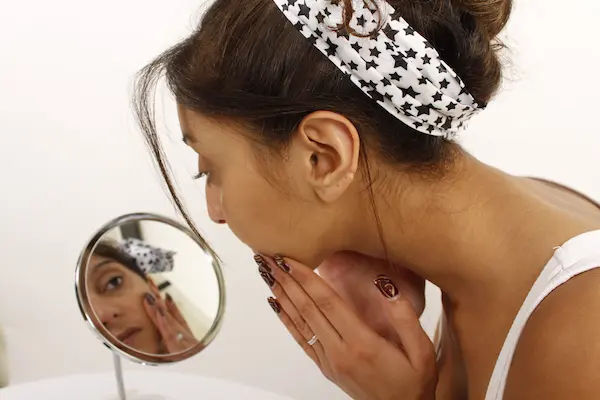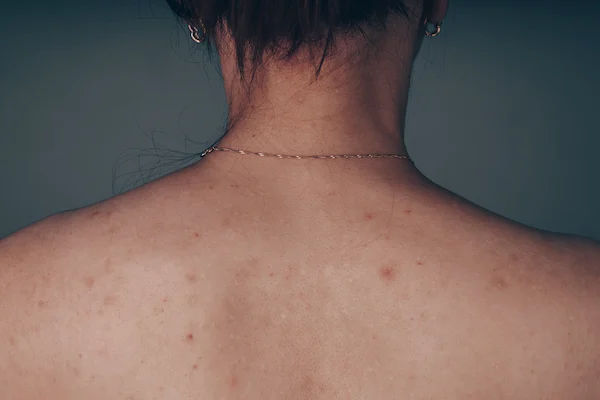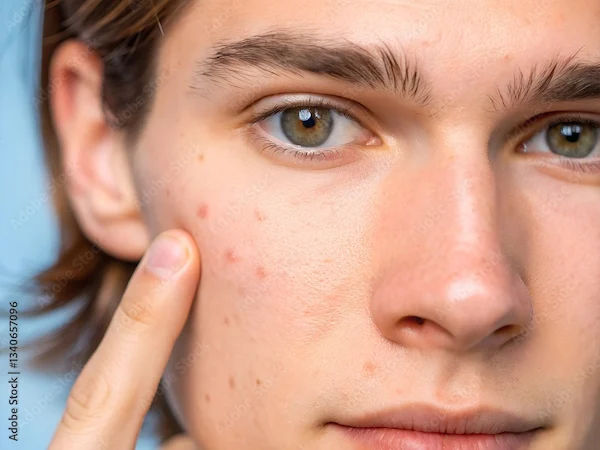Benzoyl Peroxide For Acne: Your Ultimate Guide To Clear Skin
Discover how benzoyl peroxide helps treat acne effectively. Learn about its benefits, usage, and tips for achieving clear and healthy skin.

Written by Dr Sonia Bhatt
Last updated on 13th Jan, 2026
Acne is a skin condition that affects millions of people around the world, causing frustration and a lack of confidence. While there are countless products available on the market, benzoyl peroxide has stood the test of time as one of the most effective treatments for acne. In this comprehensive guide, we will explore what benzoyl peroxide is, how it works to clear up acne, the different types of acne it targets, and provide useful tips on how to incorporate it into your skincare routine. Whether you’ve tried benzoyl peroxide before or are just beginning to learn about it, this guide will offer everything you need to know for clearer skin.
What is Benzoyl Peroxide?
Benzoyl peroxide is a powerful topical medication commonly used to treat acne. It is a compound that contains oxygen molecules, which, when applied to the skin, help to treat acne by targeting the root causes of breakouts. This product is known for its ability to treat acne effectively by reducing bacteria, excess oil, and dead skin cells—all of which contribute to the development of acne.
Benzoyl peroxide was first discovered in the early 20th century and quickly became a common ingredient in acne treatments due to its proven antibacterial and exfoliating properties. Over time, it became a staple in both over-the-counter products and dermatologist-prescribed regimens due to its versatility and effectiveness.
How Does Benzoyl Peroxide Work?
Benzoyl peroxide works in several ways to combat acne and keep your skin clear. Let’s take a closer look at the science behind its success:
Kills Cutibacterium acnes Bacteria
Acne is partly caused by an overgrowth of the Cutibacterium acnes bacteria (formerly known as Propionibacterium acnes). This bacteria thrives in clogged pores, leading to inflammation and the formation of pimples. Benzoyl peroxide releases oxygen into the pores, creating an environment that is hostile to the growth of this acne-causing bacteria. By reducing bacterial activity, benzoyl peroxide helps prevent new breakouts from occurring.
Exfoliates Dead Skin Cells
Dead skin cells can build up on the surface of the skin, clogging pores and contributing to acne. Benzoyl peroxide promotes the shedding of these dead skin cells, allowing fresh skin to surface. This process helps keep pores clear and prevents the formation of blackheads and whiteheads.
Reduces Oil Production
Excess oil production, known as sebum, is another major contributor to acne. Benzoyl peroxide helps regulate sebum production, preventing the pores from becoming blocked by this excess oil. By controlling oil levels, benzoyl peroxide helps prevent both inflammatory and non-inflammatory acne.
Types of Acne Treated by Benzoyl Peroxide
Acne can manifest in many forms, but benzoyl peroxide is effective for treating both inflammatory and non-inflammatory types:
Inflammatory Acne:
This type of acne includes red, swollen pimples, pustules, and cysts. It occurs when clogged pores become infected with bacteria, causing inflammation. Benzoyl peroxide is beneficial here due to its antibacterial and anti-inflammatory properties, which help reduce swelling and kill the bacteria that cause these types of breakouts.
Non-Inflammatory Acne:
Non-inflammatory acne includes blackheads and whiteheads. These occur when pores are clogged with dead skin cells and excess oil without significant bacterial involvement. Benzoyl peroxide helps by clearing out the pores, making it effective in preventing and treating blackheads and whiteheads.
Benefits of Using Benzoyl Peroxide
Benzoyl peroxide offers several benefits for those struggling with acne. These benefits go beyond clearing up breakouts—they help improve the overall appearance and health of your skin.
Reduces Acne Breakouts:
The primary benefit of benzoyl peroxide is its ability to significantly reduce acne breakouts by targeting the root causes of acne formation.
Prevents Future Acne:
By preventing clogged pores, killing acne-causing bacteria, and reducing oil production, benzoyl peroxide prevents future breakouts. This makes it an excellent choice for treating existing acne and keeping skin clear in the long term.
Improves Skin Texture and Tone:
As benzoyl peroxide clears your skin, it helps even out your skin texture, leaving your complexion looking smoother and more balanced. In addition, it can help lighten hyperpigmentation (dark spots) that may have developed after pimples have healed.
How to Use Benzoyl Peroxide
Proper application is key to achieving the best results with benzoyl peroxide. Here’s a step-by-step guide:
Start with a Lower Concentration:
If you're new to benzoyl peroxide, begin with a product that contains 2.5% or 5% benzoyl peroxide. This allows your skin to adjust to the treatment without overwhelming it. Higher concentrations (like 10%) may be too harsh for sensitive skin, causing excessive dryness or irritation.
Cleanse Your Skin:
Wash your face with a gentle, non-comedogenic cleanser that suits your skin type. Avoid using harsh exfoliants or scrubs, as these can irritate the skin when used with benzoyl peroxide.
Apply to Clean, Dry Skin:
After cleansing and patting your face dry, apply a thin layer of benzoyl peroxide to the affected areas. Be cautious to avoid the eyes, mouth, and sensitive areas.
Gradually Increase Usage:
Start by applying benzoyl peroxide once every other day to see how your skin reacts. Over time, you can increase the frequency of use to once or twice a day, depending on how your skin tolerates the treatment.
Use a Moisturizer:
Since benzoyl peroxide can dry out skin, it's important to follow up with a non-comedogenic moisturiser to keep it hydrated.
Potential Side Effects
While benzoyl peroxide is generally safe, it can cause some side effects, especially when you first start using it:
Skin Irritation:
Dryness, redness, and peeling are common side effects. If this happens, reduce the frequency of use until your skin adjusts, and use a soothing moisturiser to alleviate these symptoms.
Sun Sensitivity:
Benzoyl peroxide can increase your skin's sensitivity to the sun. Always apply sunscreen with an SPF of at least 30 before going outside, even on cloudy days.
To manage side effects, consider using a gentle cleanser and moisturise regularly to counteract dryness. If irritation becomes severe, consult your dermatologist for further guidance.
Precautions and Considerations
Consult a Dermatologist:
It’s always a good idea to consult a dermatologist before starting any new acne treatment, including benzoyl peroxide. A dermatologist can help determine the best treatment plan for your specific skin type and acne severity.
Consider Your Skin Type:
While benzoyl peroxide is effective for most people, those with very sensitive skin or severe acne may require a more tailored treatment approach. A dermatologist can help determine whether benzoyl peroxide is the right choice for you.
Interactions with Other Skincare Products:
If you're using other acne treatments, such as retinoids or salicylic acid, be cautious. Combining multiple acne medications can sometimes lead to excessive dryness or irritation.
Conclusion
Benzoyl peroxide is a highly effective treatment for acne, known for its ability to kill bacteria, exfoliate dead skin cells, and reduce oil production. If you haven't tried it yet, consider incorporating it into your skincare routine, starting with a lower concentration to minimise irritation. However, it's important to remember that everyone's skin is unique. For personalised advice and to ensure benzoyl peroxide is the right treatment for your skin type, consulting a dermatologist is crucial. They can provide tailored recommendations, monitor your progress, and help you navigate any potential side effects. Taking this step can make a substantial difference in your journey to better skin and boost your confidence.
Consult Top Dermatologist
Consult Top Dermatologist

Dr. Kaushiki Hajra
Dermatologist
5 Years • MBBS, MD Dermatology, Venerology & Leprosy
Kolkata
MCR SUPER SPECIALITY POLY CLINIC & PATHOLOGY, Kolkata

Dr. Kaushiki Hajra
Dermatologist
5 Years • MBBS,MD(D V & L)
Kolkata
VDC Clinic, Kolkata
(75+ Patients)

Dr. D M Mahajan
Dermatologist
35 Years • MBBS, MD (Dermatology)
Delhi
Apollo Hospitals Indraprastha, Delhi
(200+ Patients)

Dr. Sonal Jain
Dermatologist
9 Years • MBBS, MD Dermatology, Venerology & Leprosy
Kolkata
MCR SUPER SPECIALITY POLY CLINIC & PATHOLOGY, Kolkata
(25+ Patients)
Dr. Kavitha Killaparthy
Dermatologist
23 Years • MBBS,DIPLOMA(DERMATOLOGY,VENEREOLOGY,LEPROSY)
Hyderabad
JDS Skin & Hair Clinic, Hyderabad



